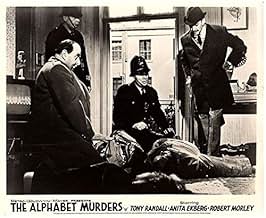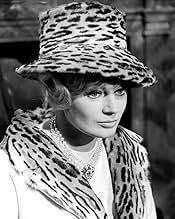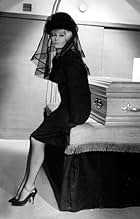The Alphabet Murders
- 1965
- 1 घं 30 मि
अपनी भाषा में प्लॉट जोड़ेंHercule Poirot investigates a series of murders in London in which the victims are killed according to their initials.Hercule Poirot investigates a series of murders in London in which the victims are killed according to their initials.Hercule Poirot investigates a series of murders in London in which the victims are killed according to their initials.
- निर्देशक
- लेखक
- स्टार
फ़ीचर्ड समीक्षाएं
The film begins with Randall introducing himself as Poirot with a twinkle in his eye. The director is clear from the first scene--comedy first, mystery next.
Robert Morley is fun, but Randall is even better--the bowling alley, the restaurant gags, the telephone calls--all scenes filled with visual, good humor rather than slapstick. Morley depends on the typical British attitudes, e.g., snapping fingers down the pecking order, jumping queues and not knowing one's shoe size all depicting arrogance of society and wealth. Director Tashlin dishes out a comedy with considerable social comment--Brits who cannot differentiate the French from the Belgian French and are in the police force!
The most intriguing bit was to introduce Margaret Rutherford as Miss Marple and Stringer Davis as Mr Stringer of the Miss Marple films bump into Randall's Poirot briefly. Surely this was a gem of an idea from Tashlin.
The film cannot be easily trashed--it offers comedy and entertainment, nearly 40 years after it was made. It is definitely not the definitive Poirot but an interesting interpretation of Poirot. It is probably one of the best Randall films ranking alongside "The Seven Faces of Dr Lao."
First, the form of the thing: in key plot elements, it is a rather close adaptation of a Christie book where a murderer "tells a story" in his murders in order to throw the police off. So it begins by being a story about fooling the detective inside another story (the movie) about trying to fool us as detectives.
The clue is about words. As a mystery, it is one of the clever explorations that Agatha had, looking at every way she could legally twist the convention of the form.
The tone of the thing is what is at issue. Peter Sellers had just had a hit with "Pink Panther" as a bumbling French detective and Poirot inherits some of this. Christie intended for him to be comic in a pompous way, and to varying degrees played with the tension between his genteel buffoonery and his sharp mechanical mind. It was not a simple joke, because her goal in part was to both describe and comment on how such an interesting mind would work.
She explored this indirectly by describing his manner, his minor superstitions, his attention to domestic ritual, the vanity of the perfect phrase, whether as a thought or a courtesy. She couldn't do that with Marple, who was as sharp but whose mind and manner was crass and impolite.
So part of the game for me in watching film versions is in how the adapter treats the relationship with the viewer so far as the mystery proper. There are all sorts of narrative mechanics that are involved there than aren't worth mentioning now. The other part is in how the mind of the detective is portrayed, and since we can only see the mind through the story (as I just said) and in the person's manner, that manner is key.
I think I liked this Poirot better than any of the others. They're all comic in one way or another, and this one seems further in tone from what was written. It is, but it may be closer in intent even though its in a context of Jerry Lewis slapstick.
Consider this: in mystery your mind and the detective's are supposed to parallel each other in important ways. In creating a version of the story -- the truth -- despite attempts to force it others wise, you both do this. So in fact, you create the world itself in a way. Some of the basic mechanics are frozen in life as in the genre, but others are completely open for you both to make: matters of how clever fate is, how comic are the wheels of nature, how inevitable is justice, what justice means, how conscience and consequence matter.
If the filmmaker can harmonize the tone of what you as viewer see and create in your own mind of the world, with what your surrogate the detective does, then he has succeeded and you can enter the movie whole.
This movie seems trivial. I think it is all but impossible to see. But it succeeds with its Poirot where no other attempt does.
Ted's Evaluation -- 3 of 3: Worth watching.
For the Miss Marple fans, there is even a humorous cameo by Margaret Rutherford and Stringer Davis, bemoaning the ineptitude of the police in solving the murders. Evidently, Ms Christie didn't like this movie--I don't know if it was the changes from the book (Anita Ekberg's character was a dark, tr oubled man in the book..) or the casting, but of course, she didn't like the Margaret Rutherford series either..go figure. Although Randall isn't who I think of when I think of Poirot, his comedic timing payed off here, and you know from the very start he intends to have fun with the role. Not my favorite Christie, but entertaining..glad I finally got to see it.
A disaster and a betrayal of the author .
Tony Randal is an acquired taste as Poirot, almost getting up your nose with an abysmal accent and acting as if he's the only one with grey cells, and overdoing that. The constant referring of him as a 'short' Belgian is the biggest mystery, as he's taller than most in the film. Poor Robert Morley tries his best, but the tedium of the film mainly comes from the rather repetitive score. Plotwise it doesn't really test the viewer, but enough is happening to keep you guessing. 30 seconds of Margaret Rutherford and spouse puts a much needed grin on the face, but it's not enough by far.
Certainly one to add to the collection, but don't rush for it at the garage sale. Overall, a huge waste of talent. Pity.
Oh, and a reviewer thinks Finney's Poirot was a masterpiece? Yeah. Right.
क्या आपको पता है
- ट्रिवियाThe official screenwriters of this movie, David Pursall and Jack Seddon, were greatly annoyed by the extensive re-writing of their script by Director Frank Tashlin and Robert Morley. Tashlin also encouraged Morley and Tony Randall to ad-lib lines and business.
- गूफ़For the swimming pool murder, when the dart is fired, the view is from behind the murderer and one can plainly see the gun is aimed below and to the right of the victim. Then in the close-up of the victim, the dart is positioned on the left side of his neck as if it had been fired from his left, not mainly from his front. In any case, it is a very unlikely shot with a dart pistol from such a long range.
- भाव
Hastings: Where have you been? What have you been doing?
Hercule Poirot: Arranging a little extra insurance my friend.
Hastings: Oh really? Personally I always feel perfectly safe with British railways. Mind you its very different in France, isn't it?
Hercule Poirot: I wouldn't know. I am not French, I am Belgian.
Hastings: Well it's the same thing, you both eat horsemeat.
- क्रेज़ी क्रेडिटTony Randall emerges from Borehamwood Studios' Stage 4 to introduce the film and acknowledge his own starring credit, first as himself and then in full Poirot make-up and character.
- कनेक्शनReferenced in What's My Line?: Jill St. John (1965)
टॉप पसंद
- How long is The Alphabet Murders?Alexa द्वारा संचालित
विवरण
- रिलीज़ की तारीख़
- कंट्री ऑफ़ ओरिजिन
- भाषा
- इस रूप में भी जाना जाता है
- Amanda
- फ़िल्माने की जगहें
- 14 Savile Row, Mayfair, Westminster, Greater London, इंग्लैंड, यूनाइटेड किंगडम(Poirot enters tailor's shop at beginning of film)
- उत्पादन कंपनियां
- IMDbPro पर और कंपनी क्रेडिट देखें
- चलने की अवधि1 घंटा 30 मिनट
- रंग
- पक्ष अनुपात
- 1.78 : 1
इस पेज में योगदान दें


































